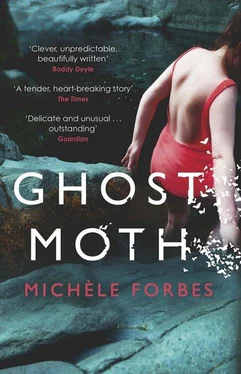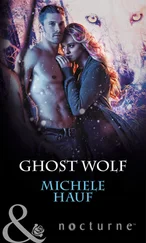Katherine acknowledges it now, her body a curve of pure energy, how she has compromised her life with George. How her betrayal of him has continued. How, throughout her married life, she has held on to the fantasy of Tom’s return.
Had he not died, would he have haunted her so?
Had he not died.
To hold him. To smell his skin. To kiss him . .
In the back room, where the fibers of love and life are woven together, the air now rings soundless.
There is something bright beside her. Bright, and luminous. She turns her head to look. She can see her own reflection on the blank television screen in the corner of the room. With the white cotton sheets falling across her shoulder and down her back, she is a giant ghost moth in a square of endless black, the earth’s edges closing around her in the tilting dark.
“That is not my face,” she says to herself.
T HE SUMMER IS OVER. AUTUMN, TOO. Now the early winter-morning sun casts long, low shadows, as though it is already evening. At night, the chill air freezes the moon and the sky settles still and black.
Back at school Maureen, Elizabeth, and Elsa have been sitting in their respective classrooms, watching their breath mist up in the cold air. In the dim gray light, the pale faces of the stern nuns look as though they have been poached in milk. At break time, when the children will run outside, the blades of crisp grass that border the school yard will snap underfoot.
The city streets have become empty black lines that lead nowhere, sealed by a biting frost. Surprisingly, as the frost gathers, intent is held in check for a time and the city is locked quiet. Reflection is an utter possibility. Anger and provocation yield under each glacial veil that falls and the city for a time becomes a beautiful white lie. How easily life slips across the surface now, as ordinary as it comes. People going about their business with only the winters’ vapors tingling through their bones, shopping and paying bills with stiffened notes, making icy trails to work and back, stoking laughter in half-heated foyers, scraping off the thin slush from their boots before they cross a neighbor’s threshold for a cup of tea. Christmas is a little way off and the violent summer seems a distant made-up past. For now, the murk of riot has hardened to a halt. For now a kind of peace has returned. But when the thaw comes after this winter there will still be ice. Thick and black and solid and immovable. After this melting, the city will still be held under an endless winter. And who would have imagined it? Who would have imagined the beautiful white lie melting to a brutal black?
Katherine has the collar of her navy winter coat pulled up across her face to shield her from the piercing wind. Elsa and Isabel have each buttoned their coats right up to the top button and wear woolen hats and gloves and thick woolen tights. Only Isabel wears boots. The fur lining of Isabel’s boots splay untidily at their tops, where two fluffy toggles hang to assist the zipping. The soles, Isabel insists, are slip-proof.
“They’re very nice boots, Isabel,” says Katherine as she walks with the two girls through Belfast’s city center.
They have come to see Hansel and Gretel at the Grove Theatre. Katherine has recently felt a renewed sense of confidence about going into the city. George has felt it too. He has been home more in recent evenings and over the past couple of months was called out to only a few house fires, one factory fire, and one fire at a farm near Comber, where an overheated sow had escaped and had stubbornly chased him through a scant-grassed, muddy field. Although soldiers had been a visible presence on the streets of Belfast since the summer, in terms of political unrest nothing much had been happening. So Katherine had suggested taking Elsa, Elizabeth, and Maureen as a treat to Hansel and Gretel (she also wanted to shake off this constant cold malaise that seemed to be hounding her). Neither Maureen nor Elizabeth, however, had shown any interest in going to the show, so Katherine had then suggested that Elsa bring Isabel.
“Do I have to bring her?” Elsa had asked sourly.
“No,” Katherine had replied, “but you’re either friends with Isabel or you’re not — which is it?”
“I bet she’ll be wearing something new sp-ee-cial-ly for the occasion,” Elsa said imitating Isabel’s pretend-squeaky-clean voice. “I bet she’ll get bought something brand-new.”
“Which is it to be?”
“Okay, then,” said Elsa finally.
Out of the cold now and sitting in the noisy theater, Elsa holds a bar of toffee in her hand and feels as though her fingers have become enormous in the welcome heat. She cannot bite the toffee bar, it is so hard against her teeth. She can only leave small indentations on the brown slab. Her mouth and lips are sticky. Isabel sits between Elsa and Katherine and does not speak, but instead sucks on a boiled sweet. She twists a strand of her blond hair around her finger with a look of self-satisfied contempt on her face.
Elsa cannot decide which is making her feel most uncomfortable, the unruly behavior of the children around her, who are shouting and firing scrunched-up balls of paper at one another, the cloying smell of the musty velvet seats and the flaky, splintery odor of old cigarettes, or the fact that Isabel is sitting beside her. Having Isabel beside her makes Elsa feel as though she has been wrapped in a cold, damp blanket.
Elsa had been right. Not only are Isabel’s boots brand-new but she also wears a brand-new dress bought “sp-ee-cial-ly” for the occasion. Katherine had reacted in stiff surprise when Isabel’s mother had informed her of the purchase, suddenly feeling concerned about whether the afternoon’s experience at the show would match up to the broderie anglaise and the ruffled pleats that Isabel was proudly displaying in front of her.
The roar of the heaters that line the walls of the auditorium suddenly stop and the lights go down. The excited yapping of the children instantly explodes into cheering and squealing. Elsa and Isabel remain silent.
“It’s about to start now,” Katherine says to Elsa, smiling at her. Elsa looks at her mother in the shadowy dark and feels warmed by her smile.
“Do you want some toffee, Mummy?”
“No thanks, pet.”
The show is a strange hybrid. A retelling of the fairy tale with some songs and some comic routines, but it isn’t a pantomime, nor is it a musical, nor is it a play. The program and the poster describe it as “A Magical Extravaganza for All the Family.” But the children in the audience are not settling to take it in and do not seem to care what kind of show it is.
The character of the wicked old woman who owns the gingerbread house is played by a man. He is trying out a high voice, but every now and then his confidence wanes and his baritone notes slip through. His movements are wiry and mechanical. He is dressed like a pantomime dame with a large unstable wig that he cannot leave alone and a wide skirt, on the hem of which he keeps trampling. He tugs at his costume to free it, and then he tramples on it again.
Isabel turns to Katherine. “I need to go to the toilet, Mrs. Bedford,” she says in a dull voice.
“Em. .” Katherine looks around her and then says to Isabel, “There they are just over to the right.” She points to the side of the auditorium and Isabel slips out of her seat. “Are you all right going on your own?”
“Yes, Mrs. Bedford. And I think I’ve got toffee in my hair.”
“Oh dear. Careful of your dress, Isabel.” Katherine cannot help but be a little concerned about Isabel’s new attire. “You’ll find us again easily enough?”
Читать дальше












